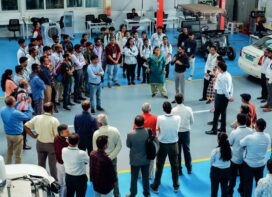Global trends such as climate change, urbanization, urban sprawl, security issues, open market economy and digitalization of the operating environment make it necessary to adapt and improve the whole transport system. Imagining an eco-habitat where people can move with minimum impact on the local environ, climate and support system preservation or induce an intelligent transport system with smart infrastructure and integrated intermodal transport system, is what is being conceived by Delhi Metro Rail Corporation in phase III. The objective is not only to solve traffic problem of the city and other related problems on mobility but to curb other impacts in terms of energy consumptions, threats to energy security, mitigating global warming, green house emission and finally to provide a liveable city and community. Papiya Sarkar, Chief Architect, DMRC elaborates.
DMRC is following credible construction practices to ensure safety & security of the people and property, health of the workers and also follows various environment mitigation measures.
Delhi Metro Rail Corporation (DMRC) was established by the Government of India and the Government of Delhi in March 1995 to build a new metro system in the capital. DMRC network in Delhi comprises of a network of underground, elevated and surface corridors aggregating to approximately 250Km with an average trip length of 15Km by 2021. Phase I and Phase II of the network are already implemented and operational. Phase III is under implementation and Phase IV is in the planning stages. It is expected that about 60% of the urban area will be within 15-minute walking distance from the proposed MRTS stations, after full development of the system. Additional areas could come within easy access and connectivity with the Metro Rail through inter-linkages with other transport modes. About 15% of urban area of Delhi is likely to be directly affected, and may undergo a dramatic change. Further, due to development of economic activities along the Metro corridors and optimization of connectivity provided by it, the rider ship on the Metro is expected to grow substantially over time. Correspondingly, it is expected that vehicular trips may also progressively shift from road based transport to MRTS, particularly, with reference to the longer trip lengths (greater than 10k) within the city.
GREEN FEATURES
In order to make a user-friendly and sustainable transport system, DMRC is working towards IGBC – MRTS Certification for all Phase III Projects. IGBC Green MRTS Rating System is primarily based on sustainability and the rating system is distributed in five Modules with allocated credit points.
Module one relates to Site Selection and Planning and DMRC is following credible construction practices to ensure safety & security of the people and property, health of the workers and also follows various environment mitigation measures. Some of the practices are construction site barricading, traffic diversion and management, wheel washing arrangement at the exit points of the project site, dust suppression measures, deploying traffic Marshall, top soil preservation, dumping of excavated materials at designated areas, and environment monitoring of construction sites. Other measures include tree plantation, use of fly ash, providing noise barriers during construction, safe disposal of sanitary and food waste, waste management by segregating waste at source (recyclable material, e-waste, hazardous waste, zero value items) and recycle and re-use of construction waste.
Inbuilt in the tendering system of DMRC are initiatives like prestart briefing, rescue operation training, mock drill at site, use of personal protective equipment, first-aid and emergency facilities, sanitation facilities and safe disposal as per relevant construction workers act Also taken in account are provision of adequate drinking water facilities as well as compliance of Construction Workers ACT as and when applicable other than ensuring hygienic, safe accommodation facilities by the construction work force. There is separate department responsible for looking after the welfare of the construction work force including providing mandatory safety training for the workers.
 TrafficInfraTech Magazine Linking People Places & Progress
TrafficInfraTech Magazine Linking People Places & Progress


